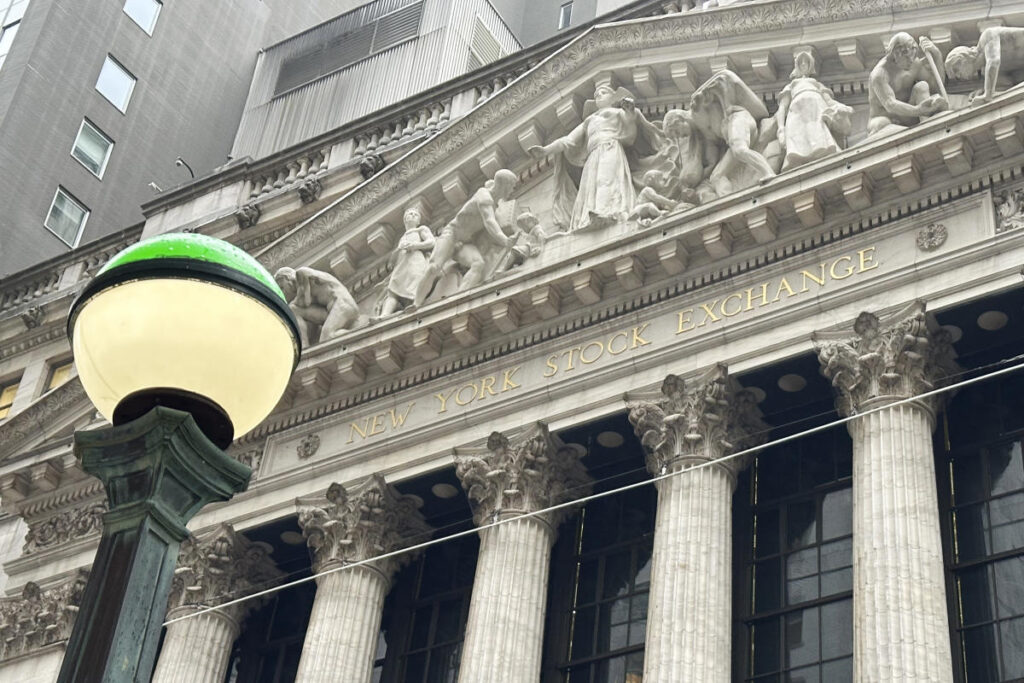NEW YORK (AP) – U.S. stocks fell Monday as the strong U.S. economy pushed up bond market yields and increased pressure on Wall Street.
The S&P 500 fell 1.2%, the worst level since October, following a 1.6% drop last week. The Dow Jones Industrial Average fell 248 points, or 0.7%, and the Nasdaq Composite Index fell 1.8%.
Stocks had been rising steadily earlier in the day as oil prices fell on hopes that international efforts to calm escalating tensions in the Middle East could help. However, U.S. Treasury yields also rose sharply following the latest report on the U.S. economy, exceeding expectations.
The economy and financial markets are in a troubling moment, and while the strength is raising hopes for higher corporate profits, it is also hurting prospects for the Federal Reserve to ease interest rates. These are his two main levers that determine stock prices and simultaneously pull Wall Street in different directions.
Much of the U.S. stock market's recent rally to record highs has been based on expectations for lower interest rates, as traders hope for lower interest rates that could boost the broader economy.
But strong reports like Monday that showed U.S. shoppers increased their spending at retail stores more than expected last month, according to data from CME Group, led traders to believe there could be one or two rate cuts this year. Most expect it to remain at . This was lower than the forecast for more than half a dozen rate cuts at the beginning of the year. Some traders are bracing for the possibility of no rate cut as inflation and the broader economy have stubbornly outperformed expectations this year.
High interest rates and bond yields negatively impact the price of all types of investments, especially those that appear expensive or that compete for the same type of investors as bonds.
As a result, real estate investment trusts were among the biggest decliners on the stock market on Monday. Higher bond yields drive away investors who might be interested in the relatively large dividends that real estate stocks pay. Rising interest rates could also put widespread pressure on real estate prices.
Office owner Boston Properties, for example, fell 3.2%.
Even more impactful was the weakness in big tech stocks. Apple fell 2.2%, Nvidia fell 2.5% and Microsoft fell 2%. They have historically benefited from low interest rates, so they often feel pressured when yields rise. These are also the biggest stocks on Wall Street, so their movements have a special impact on the S&P 500 and other indexes.
Microsoft, for example, rose 1.2% in the early going before falling in the afternoon, making it the second biggest force weighing on the S&P 500.
Some financial companies that reported strong earnings at the beginning of the year helped limit losses. With interest rates unlikely to be supportive in the short term, companies are under widespread pressure to make profits.
Goldman Sachs rose 2.9% on the news.
M&T Bank rose 4.7% after reporting first-quarter profit slightly above analysts' expectations. It also said the amount of pain that would ensue if the pressured commercial real estate industry were to take a sharp dip has been alleviated somewhat.
Charles Schwab also rose 1.7% after last quarter's profit beat analysts' expectations.
Overall, the S&P 500 fell 61.59 points to 5,061.82. The Dow Jones Industrial Average fell $248.13 to $37,735.11, and the Nasdaq Composite Index fell $290.08 to $15,885.02.
In oil markets, a barrel of U.S. crude oil for May delivery fell 25 cents as political leaders urged Israel not to retaliate following Iran's attack on Saturday with hundreds of drones, ballistic missiles and cruise missiles. The price was $85.41. Brent crude oil, the international standard, fell 35 cents to $90.10 a barrel.
Financial markets were nervous heading into the weekend. The fear was that an Iranian attack could escalate the war between Israel and Hamas and ultimately limit the flow of oil. But Israel said 99% of its drones and missiles were intercepted as diplomats urged de-escalation and the US administration made clear it would not support a widespread war with Iran.
This year's soaring oil prices have raised concerns about the ripple effect on persistently high inflation. After cooling firmly last year, inflation has consistently exceeded expectations every month through 2024.
Bank of America strategists led by Ohsung Kwon said in a BofA Global Research report that “even if economic momentum is causing inflation to stagnate, that's not necessarily a bad thing for stocks.” . “But that's what stagflation is,” he said, referring to the painful combination of economic stagnation and high inflation.
Wells Fargo Investment Institute strategists have raised their expectations for where the S&P 500 will finish this year, in part because of the surprising strength of the U.S. economy. They expect stocks to be volatile after strong gains since October, but say U.S. economic growth should boost company sales.
In the bond market, the 10-year U.S. Treasury yield rose to 4.61% from 4.52% late Friday.
___
AP writers Matt Ott and Zimo Zhong contributed.


